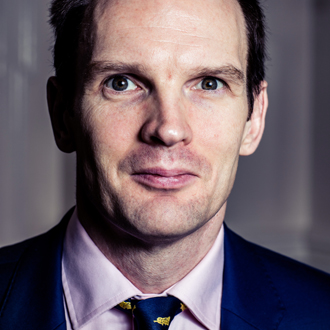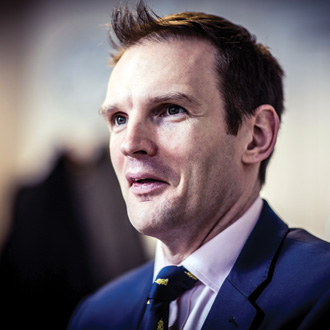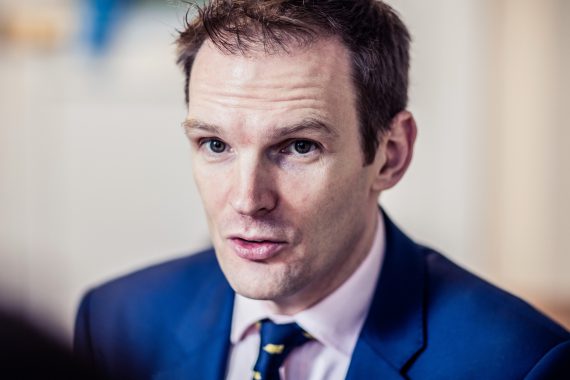
dr poulter dan jon enoch 013 3×2
Junior doctor Dr Dan Poulter has become outspoken since leaving his role as health minister following the general election of 2015.
The 6’5” Conservative MP for Central Suffolk and North Ipswich, speaking to Pulse in his Westminster office before running off for a committee meeting, offers an insight into the inner workings of the Department of Health.
And he doesn’t hold back. He is as scathing as a politician can be about his own Government, claiming the DH – including former boss Jeremy Hunt – has been ‘unhelpful’ and ‘inflammatory’ by briefing against doctors, which has contributed to the low morale of the medical profession.
His radical ideas for the future of the health service – including generating funding through increased taxation and innovative incentives to recruit GPs – may also help build bridges with the profession. It’s a far cry from three years ago, when then-GPC negotiator Dr Peter Holden reported him to the GMC for damaging the profession with his claims that the GP out-of-hours service had been ‘scrapped’ by Labour in 2004.
You have called for a special health and care tax – perhaps introduced through raising national insurance. Have you had talks with ministers about such a plan?
I came to the conclusion that we need to find more money for the health and care system when I was a minister in the DH, because quite rightly the Government has been looking for efficiency savings and quite rightly there has been a small real-terms increase in the NHS budget.
But when demand is rising by about 5% a year and the increase in funding is around about 1% a year above inflation, that’s not sustainable. So more money has to be found from somewhere.
I’ve been speaking with people across all parties, one or two who had government positions before the reshuffle in the summer, to think about other solutions for making sure we keep the health service free at the point of need. I think there is a compelling case for putting a bit more money in from our taxes to support that and that’s an argument I’m prepared to make.
It seems that the Government’s way of dealing with this is through efficiency savings of £20bn. Do you think that’s not possible?
I think it’s more than just ambitious and it’s going to be incredibly difficult to deliver. The low-hanging fruit in terms of efficiency savings were delivered in the past five years in the 2010-2015 Parliament. Most of those efficiency savings were delivered through wage restraint and that’s obviously not going to be sustainable going forward – it’s very difficult to continue reducing the wages of hardworking NHS staff in real terms on a long-term basis.
By 2020, we’ll have almost had a decade of pay restraint and that’s unprecedented in any service in the public or the private sector.
So it’s right to look at properly rewarding NHS staff. We’re not talking necessarily about big pay increases, we’re talking about pay increases that recognise that the prices in the shops have gone up over a 10-year period and that doctors will over that decade have seen a small reduction in real take-home pay.
Health secretary Jeremy Hunt has said we need 5,000 more GPs by 2020. It seems that the Government’s still a long way off that. What do you think is the best way to try to achieve this?
I think we’ve got to look at how we properly incentivise more people to go into general practice and also look at some of the regional variations in GP recruitment.
Health Education England has put together some very good initiatives. There are some things that can be done more effectively; for example, better accrediting of people with experience of secondary care specialties to enter general practice or to contribute to general practice.
But we really need genuine incentives and investment, particularly to deal with some of the regional issues. For example, in Queensland, Australia, which has a scarcity of GPs, they incentivise people to go to work in certain areas. I think we’ve got to look at that sort of thing.
Do you think increasing funding through the core contract would help in recruiting GPs?
I think that would be helpful, because you’ve got to remember what the insurance premiums are just for GPs to practise medicine. We’re talking about several thousand pounds a year.
But the other aspect is that a lot of GPs have families and it’s no longer the case that just one parent is working – both are.
One thing we could look at is practices working collaboratively to find GPs who might be interested in moving to live in an area and considering the employment needs of any family member who might move with them.
This may involve working collaboratively with law firms, accountancy firms, or working with the local hospital if partners or dependents work in healthcare, for example.
In Australia, when they’ve tried to attract British healthcare staff, they’ve tried to sell it as a package, including lifestyle. I think we can learn from that to offer a much more attractive deal.
Money is going to be needed to do that, but there’s more to life than just money and it’s about working to offer a family relocation package that involves the GP, the GP’s partner and often their children’s needs as well.
You’ve spoken in the past about doctors’ low morale. Do you think the Government has got to take part of the blame?

dr poulter,dan jon enoch 005 330x330px
If I’m honest, I think there has been some very unhelpful language that’s been used particularly during the junior doctors’ strikes; some inflammatory language. I think some of the smearing of junior doctors came directly from the DH. If you speak to people who were involved in the conflict they will be very aware of some of the unpleasant briefings that were going about during that dispute.
When you’ve got that backdrop of pay restraint, increasing demand and an increasingly litigious working environment, morale isn’t in a good place. It’s the lowest I can remember in my time working as a doctor over the past decade or so.
So, do you think overall the junior doctors’ conflict was mishandled by the Government?
It wasn’t the most adeptly handled workforce dispute. I think it would have been easier during the dispute itself to recognise that less inflammatory language and more compromise earlier on might have got things to a much better place and resulted in an easier industrial relations environment. It would also probably have led to doctors feeling they were better valued, which is really what this is about.
Did you feel the strategy was going wrong when you were in the health team yourself?

dr poulter dan jon enoch016 330x330px
We had to look at how we instructed the pay review bodies. The review bodies made it very clear in their evidence that junior doctors are the real backbone of secondary care, the workhorses of the team and the people who put in the hours in the evenings and the weekends. That was something that we implicitly recognised.
After the general election, I think there was a change in emphasis, a change in rhetoric and language more than anything else. There was also a desire to push something through quickly rather than come to an agreement with the profession that would have addressed issues such as genuine workforce shortages, and how to encourage people to choose to work in shortage specialties such as general practice, paediatrics, gynaecology, psychiatry and A&E.
Do you look back on your time as a junior health minister with any regrets?
If I had known then what I know now, I would have made loud overtures to the Treasury about the need to stop salami-slicing the budget of Health Education England. We have to invest in the workforce if we’re going to deliver the right care in the future, but also we can’t set up HEE to fail. I would have liked to have made some louder noises across Government about the importance of investing in the workforce rather than perhaps just making those cases within the DH, because it’s the Treasury that really needs to listen.
I hope they’re now listening to the need to invest in the workforce, particularly with Brexit and the difficult industrial relations issues. There is a desperate need to ensure that we have enough GPs, A&E doctors and psychiatrists, paediatricians and people in all those other shortage specialties in medicine to deliver the care that patients deserve in the future.
Pulse July survey
Take our July 2025 survey to potentially win £1.000 worth of tokens












